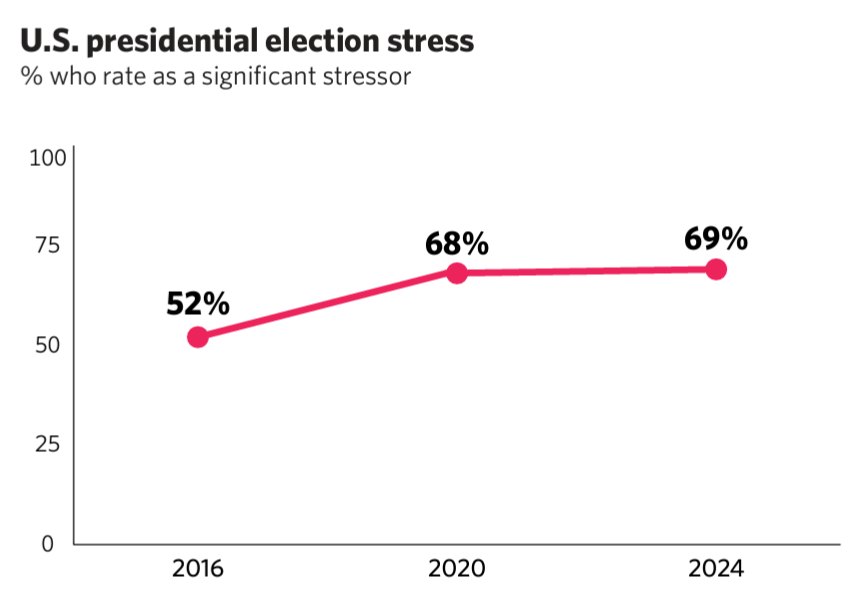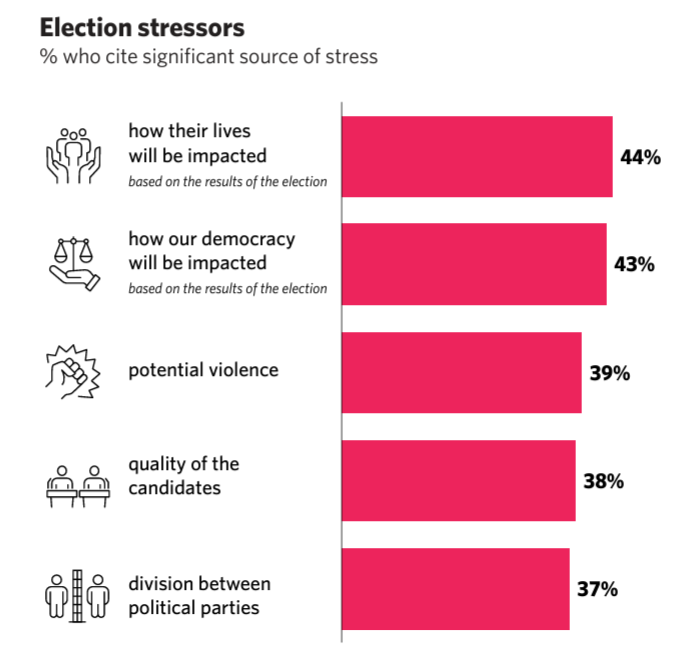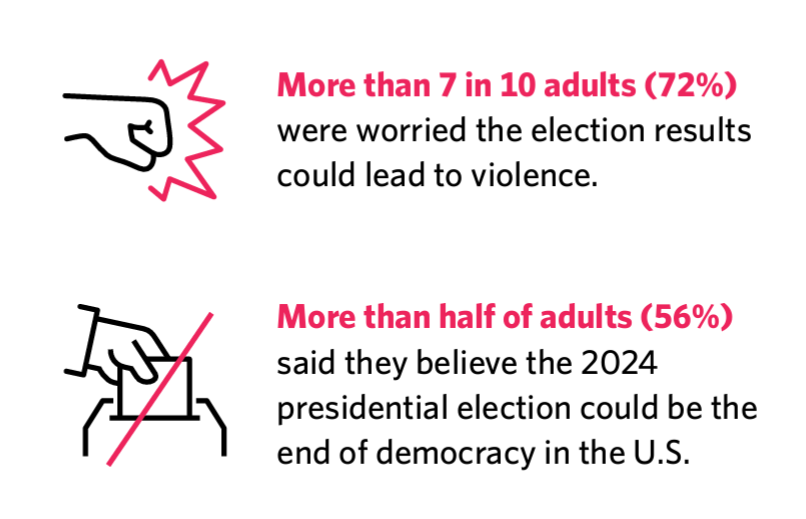Two in three people in the U.S. are dealing with Presidential Election Stress — a significant contributor to Americans’ overall stress we learn from the American Psychological Association’s study into Stress in America 2024. 
I’ve covered the APA’s Stress in America studies for many years, appreciating the role that anxiety and stress play in peoples’ overall health status and well-being. In 2024, “stress” is a mainstream factor in daily life whether you identify with Main Street or Wall Street. Here was my most recent post on the APA study here in Health Populi, with a focus on Americans’ post-COVID pandemic recovery.

Seven in 10 people in the U.S. are worried that the election results could lead to violence, and over one-half of Americans believe that the 2024 presidential election could be the end of democracy for the country.
Underneath the overall Stress-ful feelings, Americans cite various factors that contribute to election stress — at the top of the list, worries about how their lives will be impacted by the election outcome (for 44%), how “our democracy” will be impacted (43%), potential violence (39%), quality of the candidates (38%), and division between political parties (for 37% of Americans). 
In the past year, several stress factors have increased as significant contributors to Americans’ anxiety — namely concerns about mass shootings, increasing from 56% of people citing this as a significant source of stress growing to 63%; social divisiveness, up to 60% from 55%; and, the current state of race relations, increasing from 46% to 49% in 2024.
Furthermore, most Americans feel their civil rights are under attack: by race/ethnicity:
- 66% of White adults in the U.S. feel their rights are under attack
- 55% of Black adults
- 55% of Latino/a/e adults, and,
- 52% of Asian adults.
It is important to look at “hope” by race — where it was more likely to see Black men and Black women more confident about the direction the U.S. is heading compared with White men and white women. Bolstering this feeling of hopefulness, more Black men and Black women were more likely than White men and women to feel like their vote matters: 72% and 74% versus 63% and 59%, respectively. 
Health Populi’s Hot Points: With stress going mainstream in Americans’ daily lives, it is no surprise (but very concerning) that 1 in 2 adults said the tension around social and political topics makes people feel less likely to want to connect with people in general. Nearly one-third of folks said they have nothing in common with people who have different political opinions than their own.
And, nearly one-half (46%) of people said they wouldn’t date a person who didn’t share the same political opinions (roughly the same proportion of women and men in the U.S.)
The APA commissioned The Harris Poll to conduct the 2024 Stress in America survey among 3,305 U.S. adults 18 and over online in August 2024.

As we try to look into 2025 and beyond, we know that in the U.S., there are real divisions between people — divisions by gender, by race/ethnicity, by age group/generation, by type of home town (rural, urban), by income, and other demo- and psychographic factors.
Of course, in this Nation of Political Turmoil (APA’s language) there are divisions of people based on political party identification.
But the APA found areas of agreement across political party — some shown in the vertical bar chart here. For example, most Americans cross-party believe the country’s system of checks and balances isn’t working. Most people in the U.S., regardless of party ID, also believe we have lost the ability as a society to have civil disagreements.
And 4 in 5 Americans, regardless of party affiliation, believe it is important to learn how to maintain a relationship with others, regardless of whether those folks share the same values as yours. 
So even with the Stress and Turmoil in this charged political season, I will turn to one consumer respondent’s verbatim comments collected in the APA/Harris research, clipped here:
“I see with my own eyes people healing, learning, growing, being patient with one another, plus showing love, and that equals change. To actually witness it is amazing,”
the 53-year old Latina woman said.
I would guess she falls into the 50% of U.S. adults who said due to tensions in American society and politics, she would not withdraw from connecting with other people.
For the benefit of our health, individual and collective, we stakeholders in the health care ecosystem must work to ensure we bolster social health and connections with the people whose lives we touch every day. For the benefit of the nation, we must do so to bolster the well-being of the U.S. and, in turn, the rest of the world. Let’s learn from a very wise 53-year old who knows that showing love inspires change for the better.






 Grateful to Gregg Malkary for inviting me to join his podcast
Grateful to Gregg Malkary for inviting me to join his podcast  This conversation with Lynn Hanessian, chief strategist at Edelman, rings truer in today's context than on the day we recorded it. We're
This conversation with Lynn Hanessian, chief strategist at Edelman, rings truer in today's context than on the day we recorded it. We're